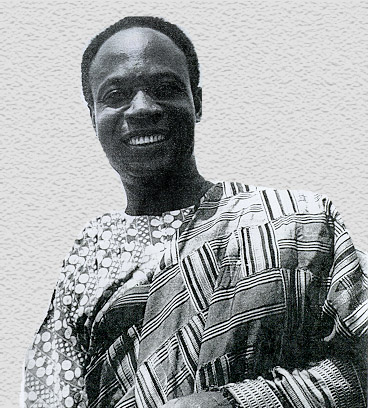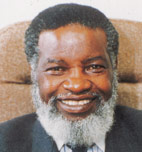Democrat October 2004 (Number 83)
EU plans for global war
Report by Brian Denny

THE Campaign Against Euro federalism was set up in the late 1980’s following the signing of Single European Act. It was this treaty, signed by the Margaret Thatcher and the Tory government, that set the EU on the road to militarisation in order to wage war for resources and markets.
Initially, CAEF warnings that Brussels intended to build an armed wing and a military-industrial complex to build its weaponry were dismissed by Europhiles as fantasy.
Kwame NKrumah first President of Ghana
Just as the eurofederalists had dismissed claims in 1975 that a yes vote in the referendum on Common Market membership would lead to the development of a single European currency, they scoffed at any suggestion that the EU would be militarised.
However, the euro exists today and the embryonic EU army already occupies parts of the Democratic Republic of Congo, Kosovo, Bosnia and Afghanisatan.
Brussels also agreed last month to create a paramilitary police force ready to launch operations anywhere across the globe. France in particular wants to create a paramilitary “gendarme” force to impose EU law following EU military actions.
A European Defence Agency, chaired by the British, has been set up to co-ordinate EU militarization as envisaged within the planned EU constitution. Italian defence minister Antonio Martino explained the EU’s military strategy of attack, reconstruction and the imposition of EU law. “There is a military phase and then reconstruction: the real problem is the transition phase and how this is tackled,” he said.
EU Chief of military staff Lieutenant General Rainer Schuwirth paraded this vision of euromilitarism by confirming that “national governments would have to give away their authority over their army”. He said for that to happen EU would have to be “deepened”, as envisaged within the EU constitution.
Article I-15 of the constitution states: "Member states shall actively and unreservedly support the Union's common foreign and security policy in a spirit of loyalty and mutual solidarity".
Despite the fact that not one country has ratified the controversial document, EU foreign policy tsar Javier Solana is already setting up his European foreign ministry as envisaged in the constitution.
EU good US bad?
Recent splits over Iraq, between France and Germany on the one hand and Britain, US and the majority of EU states on the other has encouraged childish misconceptions of the concept of “Europe good, US bad”.
Such wishful thinking extends to liberal academics and pundits claiming that Brussels will be a “counterweight” to US imperialism.
However, this vision has little to do with “humanitarian” aspirations. In fact the “common” EU foreign and defence policy, as it is known, would be a “single”, deeply imperialistic, foreign policy decided by the big EU powers, regardless of the thoughts of smaller EU powers.
In fact, British, French and German leaders inserted the militarisation plans in the constitution that had already been cooked up at a big power summit in Berlin. French defence minister Michele Alliot-Marie said that Britain and France would form an “avante-garde” of EU militarisation.
Javier Solana has also declared that EU military force should be used, alongside the US, against any sovereign state to stop the proliferation of weapons of mass destruction, thereby retrospectively sanctifying the illegal attacks on Iraq.
“We should be able to sustain several operations at the same time. We must develop a culture that fosters early, rapid and robust intervention,” he said. He claimed the EU/US western alliance is a “formidable force for good in the world”.
This once more exposes eurofederalist claims of creating a global counterbalance as a lie.
In fact, EU leaders have targeted Iran, already under the threat of US attack, due to Tehran’s continuing nuclear programme. However, the fact that the western-backed military dictatorship in Pakistan actually possesses illegal nuclear weapons has been conveniently ignored.
Global war policy
 The Eurofederalist dream has always been to build a global military and economic power – a superstate – to dominate the world along with, and as a rival to, the US. Within this superstate, the largest states Germany, France and Britain will impose project their own interests through a single EU economic, legal and foreign policy.
The Eurofederalist dream has always been to build a global military and economic power – a superstate – to dominate the world along with, and as a rival to, the US. Within this superstate, the largest states Germany, France and Britain will impose project their own interests through a single EU economic, legal and foreign policy.
Sam Nujoma first President of Namibia
Such a set up would force weaker states to follow or be excluded from the bounty. For Germany the prize is Eastern Europe and the Balkans and for Britain and France, Africa.
Jaques Delors even once openly declared that an EU army will be required to “fight the resource wars of the 21 century.” This is the real politik of the EU. It can be charactised as five broken empires with Britain making up the sixth coming together as one imperial force.
Ghanaian leader Kwame Nkurumah pointed out back in 1960s “the disappearance of numerous old fashioned colonies owing allegiance to a single metropolitan country and the replacement of ‘national imperialisms’ by a collective imperialism” today known as the EU.
Tony Blair’s foreign policy advisor Robert Cooper articulated this global war policy by boldly stating that what is required is a “new imperialism” which required EU citizens to get used to double standards and tolerating endless western aggression against poor, resource-rich states such as those in Africa.
A perfect example of this aggressive new imperialism was the illegal NATO attacks on Yugoslavia. NATO leader Lord Robinson even declared at the time that the “rubicon had been crossed” and illegal attacks on sovereign states by the worlds strongest states was now acceptable.
Britain carried out this policy with the intervention in Sierra Leone in 2000 to further its own interests against rebels that controlled large areas of the diamond fields. Prior to British troops landing British mercenaries working for Sandline and Executive Outcomes were fighting the rebels and breaking an arms embargo with the full sanction of then foreign secretary Robin Cook.
British imperialism pumped military aid into the country to maintain a firm foothold in this strategically important region of West Africa and dominate the lucrative diamond trade. France also has troops in nearby Ivory Coast and the EU army has a force in Congo, which has been described as one of the richest parts of the planet containing oil, gold and other minerals.
Today the EU and member states are sending troops to secure their own interests. It is clearly a question of who gets there first, it is not for nothing that the EU army is called a Rapid Reaction Force.
Namibian President Sam Nujoma has clearly defined this new European military strategy: "These Europeans, they formed a political union and again they want to get our raw material without paying us."
In short, the euro is structural adjustment for European capital, demanding the wholesale privatisation of entire industries at home and abroad, the new European legal identity is designed to ensure it is imposed and the European army has been unleashed across the globe to ensure it stays that way.